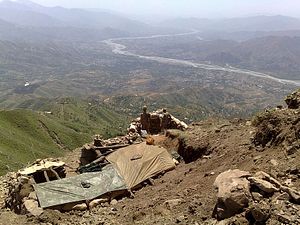The Pakistani government has in principle approved a landmark five-year plan to bring the country’s lawless tribal belt into the mainstream of national politics.
The current Report of the Committee on the Fata Administrated Tribal Areas (FATA) has proposed the merger of FATA with Khyber Pakhtunkhwa province. Moreover, the committee has also proposed the abolition of the Frontier Crimes Regulation (FCR) Act. The FCR, which is applicable to the FATA, was codified into law under British rule in 1901.
The law has remained applicable to Pakistan’s tribal areas even after the country’s independence and arguably has surfaced as the first parallel judicial system in Pakistan. The FCR, however, has come to be known as a draconian law for its ruthless, inhuman, and discriminatory provisions. For instance, under the FCR rules:
the entire system of inquiry is carried out by a Jirga rather than a process of presenting evidence, examination and cross examination of witnesses, etc. It also is not permitted to engage council. Appeals to the superior judiciary i.e. the Supreme Court and High Court of Pakistan which are the constitutionally guaranteed right of every citizen of Pakistan, are denied to persons subject to the FCR.
Successive governments since Pakistan’s inception have pledged reforms in the FATA. However, the pledged reforms that could have revamped the militancy-wrecked tribal region have never been implemented in action. The region’s poverty, political and economic marginalization, and social isolation have allowed a space to emerge for radicalization and militant groups such as the Taliban and Al-Qaeda have used these factors to gain control safe havens in the region.
As Ebad Baig notes in his book Pakistan: Time for Change:
It was only in 1997 when residents of FATA were granted rights to vote in general election and represented in Parliament. Since FATA is not included in the Political Parties Act of Pakistan, residents of FATA are not allowed to contest election under any party or form their own and only Islamist candidates can campaign, giving mullas another source of influence in the region.
Baig continues:
FATA is the poorest region of Pakistan with 60 percent of the 3.2 million inhabitants living below the poverty line, a mere 17 percent literacy rate, no proper access to clean drinking water and lack of access of healthcare and no public schools or education system.
Generally, the political parties in Pakistan have always recognized the need for political, economic, and social reforms in the country’s tribal regions. In 2009, the Pakistan People’s Party (PPP) proposed FATA reforms, which were as far reaching as:
allowing activities in FATA, setting up an appellate tribunal, curtailing arbitrary powers of political agents, giving people right to appeal and bail, excluding women and children from the territorial responsibility clause and envisioning audit of accounts by the auditor general.
In 2013, the desire for reforms was reiterated by a ‘Grand Assembly’ of the people of FATA, which proposed reforms including:
setting up a FATA council to be elected on the basis of adult franchise; extension of the jurisdiction of [Peshawar] High Court and the Supreme Court to FATA; and letting people decide about the status of FATA – whether it would be a separate province, merged with Khyber Pakhtunkhwa or retain the present status.
While reforms related to the country’s tribal areas have been on the agenda of almost all major political parties in Pakistan, the implementation of the reforms has largely been stalled due to the region’s paramount geostrategic significance in terms of the country’s security policies. Pakistan’s tribal areas have always remained susceptible to the risks of international terrorism due to the various geopolitical and sociocultural factors described above.
Accordingly, the military has always had a major role in steering the course of the area’s political future. In retrospect, the FATA’s loose governance structure suits the country’s regional security policies, for an isolated FATA provides strategic space for Pakistan to pursue its policy of strategic depth in Afghanistan and beyond. Arguably, militants wouldn’t have been able to secure sanctuaries in FATA had the country’s constitution been implemented in its full form in the tribal region along Afghanistan.
In a way, Pakistan’s security policies have always undermined FATA’s prospects for reform and the region’s isolation is likely to persist unless the country overhauls its current security policies. It’s too early to say if the newly announced reform proposals would actually enter the implementation phase, for the country’s Army continues to remain engaged in a military campaign against militants in the region. Moreover there appears no change in the country’s regional security policy, which, as mentioned before, requires Pakistan’s tribal region to remain lawless.
Afghanistan’s peace and stability is directly linked to the peace and stability of Pakistan’s tribal region. Additionally, Pakistan’s military efforts to secure the area should also include necessary political reforms. It is high time that Pakistan implements political reforms in FATA, which are essential to end the region’s decades-long isolation from rest of the country.

































